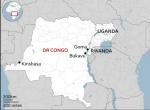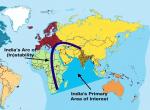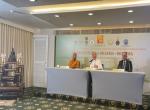The curtains drew close on the 20th National Congress of the Communist Party of China (CPC) on 22nd October 2022. The CPC’s national congresses are one of the most important gatherings not only for China as elite politics witness personnel changes that last for the coming 5 years or more but also for the whole world as it lays bare indications of the direction towards which the major power will be heading in the coming years. Like previous congresses, this year’s congress was also watched by China observers around the world with all the more attention to detail as China moves toward playing an increasingly important role on the world stage while tensions with the US continue to simmer[1].
In the Great Hall of the People, General Secretary Xi presented the work report on behalf of the 19th Central Committee of the CPC to the 20th Congress. The report indicated the elements of both change and continuity. Continuity in emphasis on ideology and striving to enhance key sectors that arch over the canvas of China’s developmental goals were prominent in the work report. Whereas, changes were seen in terms of informal norms such as the age limit being pushed aside, precedents being broken in appointment to certain positions and pronounced emphasis on security and risks that may be foretelling a tweaked outlook in the CPC echelons.
Scholars have long argued that the “reason behind the durability of China's political order is the increasingly norm-bound nature of its succession politics”[2]. It can further be argued that not just in the succession of the top leader, norms, in general, reduce the chances of instability, factionalism and infighting. It provides a more definitive and structural outlook into the future which helps a regime stay stable in the present. One may think that the informal norms that were pushed aside may bring instability in Chinese politics in the longterm, but paradoxically, the informal norms might have been broken to ensure stability in the wake of domestic and international situations which are not very favourable to the PRC right now. These include but are not limited to the economic unease in the wake of China tackling covid with lockdowns on the domestic front[3] and increased tensions with the US and in the Taiwan straits on the international front[4].
At the 20th Central Committee’s (CC) first plenum, when the new members of Politburo and its standing committee were chosen[5], many changes came as a surprise to international China watchers. The new Politburo now consists of 24 members, 1 less than the previous politburo whereas the PBSC continues to have 7 members. There are 13 new members in the 20th Politburo whereas 11 members have been retained from the previous one. This is the first time since the 16th Politburo (2002-2007) to have an even number of members. Generally, the Politburo and its Standing Committee are composed of an odd number of members so that there is no deadlock on decisions that require voting. But it appears that this consideration has been side-lined this time. Expectations of either Shen Yiqin, the Guizhou party secretary or Shen Yueyue, the vice chair of the NPC standing committee entering the politburo were met with disappointment, making the politburo an all-men’s team, for the first time since the 15th Politburo[6]. It appears that Mao Zedong’s famous words “Women hold up half the sky” may stand true in the rest of China but not at least in the power centre of Zhongnanhai.
The two prominent factions (Jiang Zemin-Zeng Qinghong faction and Communist Youth League Faction) have now been completely decimated in the top leadership. 4 out of 6 members (apart from Xi) have distinct and strong ties with Xi[7]. Li Qiang, the former Shanghai party secretary is the second-ranked PBSC member who is usually the Premier of the state council. It has been customary that all the premiers(except for the first premier of the PRC Zhou Enlai) have first served as a vice-premier in the state council learning the ropes before taking on the heavyweight role. To dispel any doubts that may arise, it should be noted that not a single member of the PBSC has served as a vice-premier at any point. Hence, it can be firmly concluded that the informal rule that only a vice-premier ascends to the role of premier no more exists. However, to not break the informal rule of a premier having experience as a vice-premier, the NPC Standing Committee has the option of first appointing him as a vice-premier before next March's NPC session under a law which was passed in 2021[8].
The second, an all-obvious informal norm of succession was broken by Xi that took shape in the last two decades. Although there has never been any term limit to the post of General Secretary, the term limit for the PRC President was removed from the state constitution during the “two sessions” of 2018. Serving two terms by the General Secretary had become a norm and even major state media publishing houses also believed so[9]. Just when the world started believing that a succession norm in China was getting institutionalized, a question mark now lies over the issue. What does it mean for the future of Chinese politics as Xi continues to hold the positions of CMC Chairman and Party General Secretary with a high likelihood of holding on to the post of PRC Chairman in March, completing the trinity of offices for a third term?
Looking at successions through a macroscopic lens, in the history of PRC, one would find that only the last two handovers of power can be considered smooth and bound by a seeming sense of norms. So,in the future, successions that come as a surprise or are dictated by power struggles will not be out of line with what Chinese politics has witnessed since the founding of the PRC.
The third norm that has been broken is the violation of the “seven up, eight down” (qi shangbaxia七上八下) retirement age, which was seen in the Politburo with the inclusion of Zhang Youxia and Wang Yi (as well as Xi’s inclusion in the PBSC). Both of these instances were unexpected but not completely unforeseeable after recent changes were made in the “Regulations on the Promotion and retirement of Leading Cadres”(推进领导干部能上能下规定)[10].
The domains to which Wang Yi and Zhang Youxia belong should also be taken into consideration while looking at the side-lining of the informal norm. Wang Yi will likely replace Yang Jiechi as the head of the Party’s Central Foreign Affairs Commission, the highest position in the foreign affairs apparatus in China. Wang Yi’s promotion denotes continuity in Chinese foreign policy. Under the current situation where strain in Sino-US relations and tensions in the Taiwan straits are increasing[11], a seasoned diplomat like Wang Yi can be an asset to China.
Zhang Youxia’s father Zhang Zhongxun and Xi Jinping’s father Xi Zhongxun served together as Commander and Commissar respectively in counterattacks against KMT in an area north of Xi'an in 1945. Since then, both of them along with their families have deep ties[12]. Zhang is a veteran of the Sino-Vietnamese War[13], has experience of serving in Yunnan, Beijing, and Shenyang as well as heading the CMC Equipment Development Department[14]. The retention of Zhang appears to be stemming from a need for continuity in the CMC functioning coupled with the need for actual combat experience, loyalty and familiarity withthe “barrel of the gun” through which “political power grows” as Xi starts his unprecedented third term.
Communist Youth League (CYL) faction members in the PBSC, Li Keqiang and Wang Yang have been booted off and Politburo member Hu Chunhua (also from CYL) who was widely expected to be elevated to the PBSC has been dropped even from the Politburo which leaves them the scope to land only ceremonial/unimportant roles such as vice chairman of the NPC, vice-chairman of the national committee of the CPPCC or the PRC vice-president.
One may find it surprising how all the CYL faction members were booted off the central leadership in one go while others who were over the age of 68 were kept on the basis of recently changed regulations. Wang Yang and Li Keqiang did not cross the age of 68 which is the informal age of retirement for the CPC officials of the topmost leadership according to the 七上八下 norm. In the last two decades, no PBSC member has been booted off before he reached the age of 68. Perhaps the answer to such an outcome can be attributed to Xi’s general dislike of the CYL which came to the fore when in 2016, a central inspection team from the Central Commission for Discipline Inspection(CCDI) raided the Central Committee of the CYL[15]and found in a book by the Party Literature Research Centre of the CPC Central Committee, titled ‘Excerpts from Xi Jinping's Discussion on Youth and the Work of the Communist Youth League《习近平关于青少年和共青团工作论述摘编》”, which compiled Xi’s speeches on the CYL. The book mentions that Xi harshly criticized the League for "chanting inane slogans" and "having its four limbs paralyzed."[16], [17]
Chen Wenqing, the former Minister of State Security (MSS) has been appointed the Central Legal and Foreign Affairs Commission (CPLAC) Secretary[18]. In this case also the Party has broken precedent as earlier CPLAC Secretaries first served as the Minister of Public Security (MPS) and then moved towards CPLAC Secretary. In fact, Chen Wenqing as the Minister of State Security being in either the Central Secretariat or the Politburo was a first as well. CPLAC is a powerful organization under the wings of the Party that oversees all legal enforcement authorities and has heads of domestic and national security as its members. The shift from the inward-focusing MPS head leading the CPLAC towards outward focusing MSS head leading it shows a growing focus of the CPC towards the external security environment in the wake of increased tensions with the US and in the Taiwan straits.
After the 20th Party Congress reshuffle, now the CPC Secretariat includes Chen Wenqing and Wang Xiaohong (current MPS head) and Liu Jinguo (former deputy Minister of the MPS and current deputy director of National Supervisory Commission), three security-related secretaries among the 7 secretaries. This perhaps also echoes Xi Jinping's emphasis on the importance of national security in his political report to the 20th National Congress[19].
Unlike Hu Jintao and Xi Jinping who were known to be successor-apparent, there is none that emerged in the 20th Party Congress. The leadership line-up is such that none of them has the right combination of age and experience that could make them a possible successor. The youngest PBSC member is Ding Xuexiang who is 60 but slated successors are generally appointed in the politburo standing committee much earlier like Xi was at 54 and Hu at 49. The absence of any successor-apparent may help Xi’s authority remain undiluted and suggests that he will be in charge for some time now which prevents turning his third term into a “lame-duck situation”.
Overall, it appears that the rules that govern the personnel arrangement of the Party are in gradual decline. There seem to be few predictable rules for promotion and succession left as could be seen by the new leadership line-up. When Xi became the General Secretary in 2012, he was not known as the head of any faction within the party. But during his tenure, several people were promoted who were close to him, leading to consolidated power and the formation of a dominant faction under him due to which it was widely believed that Chinese politics have moved on from being a power balance between factions to being driven by a dominant faction under President Xi[20]. But what we have seen in the 20th Party Congress and the subsequent 1st Plenum of the 20th CC indicates that no other factions are left in the CPC’s top leadership. However, there is also an expectation that things may change as factions among Xi’s proteges are formed, with officials from Zhejiang, Fujian and Shanghai(all three being Xi’s earlier places of posting) gradually forming their own factions[21]. For now, this is in the future.
It is apparent that Xi giving priority to his own ties in promotions and precedents being broken was done keeping in mind the requirements of China at the current stage as he understood them. While there is a lot that shows Xi has consolidated power, the international press has constantly labelled Xi as a leader who is getting increasingly powerful in an individual capacity and appears unchallenged within the party[22], but perhaps this domination by Xi in the party apparatus is not just the doing of Xi alone wherein he has “hijacked” party’s institutions and carved out a 3rd term for himself. There are some scholars who believe that such concentration of power is probably the collective choice of the CPC to deal with the crises that are on China’s doorstep[23], [24]. There are myriad problems that plague China today, including but not limited to rising unemployment[25], covid lockdowns and its associated problems, weakening economic growth prospects[26], a trend of the declining working-age population in China[27], and not to mention the general hostility China faces from the West in the world stage[28]. In the wake of such conditions, perhaps Xi is actually a leader that is favourable for the CPC’s grip over power in the country because he is a “safe pair of hands and not a boat rocker”[29] who will continue to “hold high the banner of socialism with Chinese characteristics”, as suggested by the title of his report at the 20thParty Congress, while ensuring that the party with him as the core remains firmly in charge.
This was reflected in the 20th Party Congress and the 1st Plenum: a pronounced emphasis on security[30], a faction-less leadership team with an unprecedented number of leaders in the Politburo and its Standing Committee with strong ties to Xi who can carry out his policies to the letter. Side-lining informal norms and breaking precedents to include loyalists in positions of importance in the wake of a contentious domestic and international environment suggests that this new era of politics in China will continue to be defined by the exigencies of the Communist Party as seen in history. Deng Xiaoping recognized the pressing need to carry out reforms and open up. Jiang Zemin addressed the need to include businessmen in the party when China saw that economic and social changes brought on by the reforms required the party to broaden its base. The exigency this time around appears to require centralization, and to meet this agenda, we saw informal norms taking a back seat, and new trends emerging as Xi begins his third term. These developments around the 20th party congress indicate that this is the end of an era in Chinese politics and the dawn of another.
End Notes/References :
[1]Worsening China-US relations ‘raise risk’ of conflict in Asia-Pacific | South China Morning Post. Accessed November 6, 2022. https://www.scmp.com/news/china/diplomacy/article/3198426/worsening-china-us-relations-raise-risk-conflict-asia-pacific
[2]Smith E. On the Informal Rules of the Chinese Communist Party. China Q. 2021;248(S1):141-160. doi:10.1017/S0305741021000898
[3]JABIN T. JACOB. A litany of economic woes but in China politics rules. 9dashline. Published 2022. Accessed November 6, 2022. https://www.9dashline.com/article/a-litany-of-economic-woes-but-in-china-politics-rules
[4]How China is responding to escalating strategic competition with the US. Accessed November 6, 2022. https://www.brookings.edu/articles/how-china-is-responding-to-escalating-strategic-competition-with-the-us/
[5]党的二十届一中全会产生中央领导机构习近平任中共中央总书记中央军委主席. 人民日报. Published October 24, 2022. Accessed November 6, 2022. https://baijiahao.baidu.com/s?id=1747520314813289743&wfr=spider&for=pc
[6]中国共产党历次全国代表大会数据库. 人民网. Published September 19, 1997. Accessed November 6, 2022. http://cpc.people.com.cn/GB/64162/64168/64568/65400/4429281.html
[7]Yew Lun Tian. Factbox: China’s new political elites and their connection to Xi | Reuters. Reuters. Published October 24, 2022. Accessed November 10, 2022. https://www.reuters.com/world/china/chinas-new-political-elites-their-connection-xi-2022-10-24/
[8]2021 NPC Session: Dissecting the Amendments to the NPC’s Two Governing Laws (Updated). NPC Observer. Published 2021. Accessed November 6, 2022. https://npcobserver.com/2021/03/02/2021-npc-session-dissecting-the-amendments-to-the-npcs-two-governing-laws/
[9]曾渊沧. 曾渊沧:中共新班子具独特优势_新浪新闻. 环球时报. Published November 19, 2012. Accessed November 9, 2022. http://news.sina.com.cn/c/2012-11-19/134625611495.shtml
[10]领导干部能上能下!中办印发重要规定. 中国甘肃网. Published September 21, 2022. Accessed November 6, 2022. https://baijiahao.baidu.com/s?id=1744507663565969586&wfr=spider&for=pc
[11]Nancy Pelosi Taiwan Visit: Pelosi Leaves Taiwan, but Tensions Rise in Her Wake - The New York Times. The New York Times. Published 2022. Accessed November 6, 2022. https://www.nytimes.com/live/2022/08/03/world/pelosi-visit-taiwan-china
[12]Lyle J. Morris. What China’s New Central Military Commission Tells Us About Xi’s Military Strategy | Asia Society. Asia Society Policy Institute. Published 2017. Accessed November 6, 2022. https://asiasociety.org/policy-institute/what-chinas-new-central-military-commission-tells-us-about-xis-military-strategy
[13]Lyle J. Morris. What China’s New Central Military Commission Tells Us About Xi’s Military Strategy | Asia Society. Asia Society Policy Institute. Published 2022. Accessed November 6, 2022. https://asiasociety.org/policy-institute/what-chinas-new-central-military-commission-tells-us-about-xis-military-strategy
[14]张又侠_百度百科. 百度百科. Accessed November 6, 2022. https://baike.baidu.com/item/%E5%BC%A0%E5%8F%88%E4%BE%A0/8571945?fr=po_ala
[15]共青团中央书记处通报巡视整改情况 严肃查处违纪问题--时政--人民网. 人民网. Published April 25, 2016. Accessed November 9, 2022. http://politics.people.com.cn/n1/2016/0425/c1001-28302072.html?S=3gm5e/index.html
[16]KATSUJI NAKAZAWA. Xi silences once-powerful youth league and former president’s protege - Nikkei Asia. NIKKEI ASIA. Published September 25, 2017. Accessed November 9, 2022. https://asia.nikkei.com/Politics/Xi-silences-once-powerful-youth-league-and-former-president-s-protege
[17]新唐人. 习近平罕见痛批共青团:四肢麻痹高位截瘫-万维读者网. 万维读者网. Published September 17, 2017. Accessed November 9, 2022. https://m.creaders.net/news/page/847513
[18]陈文清任中共中央政法委书记. 北京日报客户端. Published October 29, 2022. Accessed November 6, 2022. https://baijiahao.baidu.com/s?id=1747977382085087033
[19]党的二十大报告(全文). 中国人体器官捐献. Published November 2, 2022. Accessed November 6, 2022. https://baijiahao.baidu.com/s?id=1748274615012385702&wfr=spider&for=pc
[20]Choi EK, Givens JW, MacDonald A. From Power Balance to Dominant Faction in Xi Jinping’s China. China Q. 2021;248(1):935-956. doi:10.1017/S0305741021000473
[21]Cheng Li. Will China’s strongman become even stronger? What the 20th Party Congress means for the United States. Brookings Institution. Published October 4, 2021. Accessed November 6, 2022. https://www.brookings.edu/events/will-chinas-strongman-become-even-stronger-what-the-20th-party-congress-means-for-the-united-states/
[22]Amelia Nierenberg. Your Monday Briefing: Xi Jinping Consolidates Power - The New York Times. The New York Times. Published October 23, 2022. Accessed November 6, 2022. https://www.nytimes.com/2022/10/23/briefing/xi-communist-china-asia-johnson.html
[23]滕彪. 滕彪:新戊戌变法的变与不变. HRICHINA. Published April 5, 2018. Accessed November 6, 2022. https://www.hrichina.org/chs/zhong-guo-ren-quan-shuang-zhou-kan/teng-biao-xin-wu-xu-bian-fa-de-bian-yu-bu-bian-tu
[24]Peter Symonds. Xi Jinping’s power grab: Bonapartism with Chinese characteristics - World Socialist Web Site. World Socialist Web Site. Published March 1, 2018. Accessed November 6, 2022. https://www.wsws.org/en/articles/2018/03/01/pers-m01.html
[25]1 in 5 of China’s urban youth are unemployed. That’s a huge headache for Xi Jinping | CNN Business. CNN. Published September 19, 2022. Accessed November 6, 2022. https://edition.cnn.com/2022/09/19/economy/china-youth-jobs-crisis-xi-jinping-intl-hnk-mic
[26]Five reasons why China’s economy is in trouble - BBC News. BBC. Published October 5, 2022. Accessed November 6, 2022. https://www.bbc.com/news/world-asia-china-62830775
[27]China’s Demographic Trends in the Context of Economic Competition. Center for Strategic and International Studies. Published August 18, 2022. Accessed November 6, 2022. https://www.csis.org/blogs/new-perspectives-asia/chinas-demographic-trends-context-economic-competition-%E2%80%AF
[28]Heads of FBI and MI5 issue strong warning about threat to the West from China. NBC News. Published 2022. Accessed November 6, 2022. https://www.nbcnews.com/politics/national-security/heads-fbi-mi5-issue-strong-warning-threat-west-china-rcna36976
[29]Adlakha H. 2022: Xi Jinping’s Annus Horribilis or Annus Mirabilis? - Modern Diplomacy. Modern Diplomacy. Published August 27, 2022. Accessed November 9, 2022. https://moderndiplomacy.eu/2022/08/27/2022-xi-jinpings-annus-horribilis-or-annus-mirabilis/
[30]China’s 20th Party Congress Report: Doubling Down in the Face of External Threats. Center for Strategic and International Studies. Published October 19, 2022. Accessed
(The paper is the author’s individual scholastic articulation. The author certifies that the article/paper is original in content, unpublished and it has not been submitted for publication/web upload elsewhere, and that the facts and figures quoted are duly referenced, as needed, and are believed to be correct). (The paper does not necessarily represent the organisational stance... More >>
Image Source: https://p5.img.cctvpic.com/photoworkspace/contentimg/2022/10/23/2022102313483965672.jpg











Post new comment